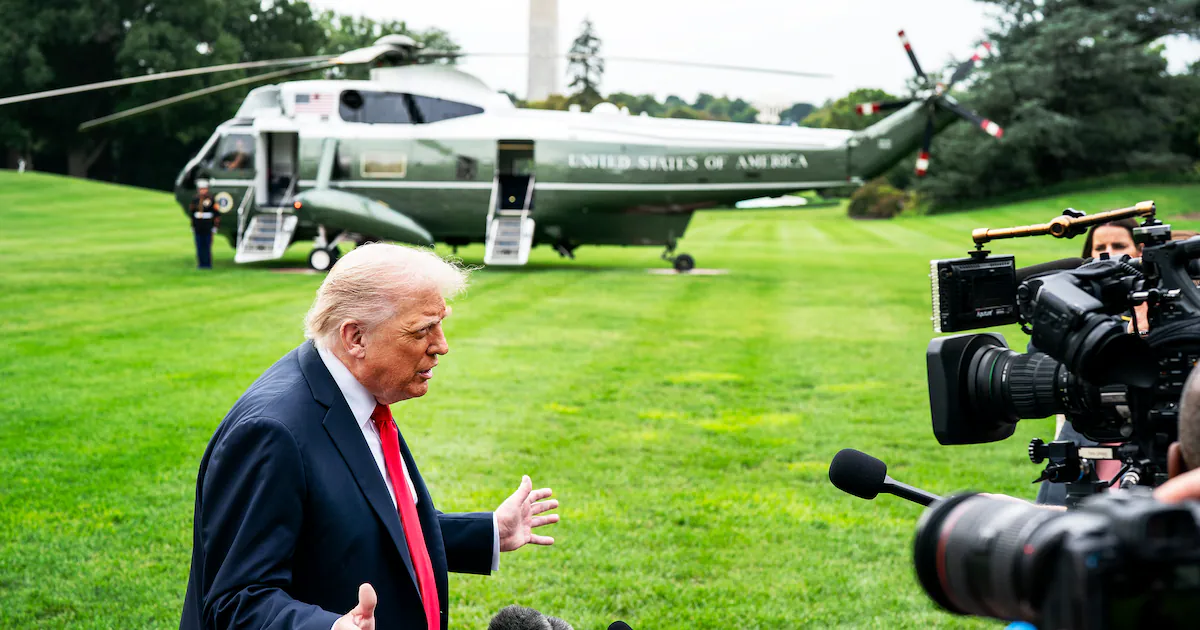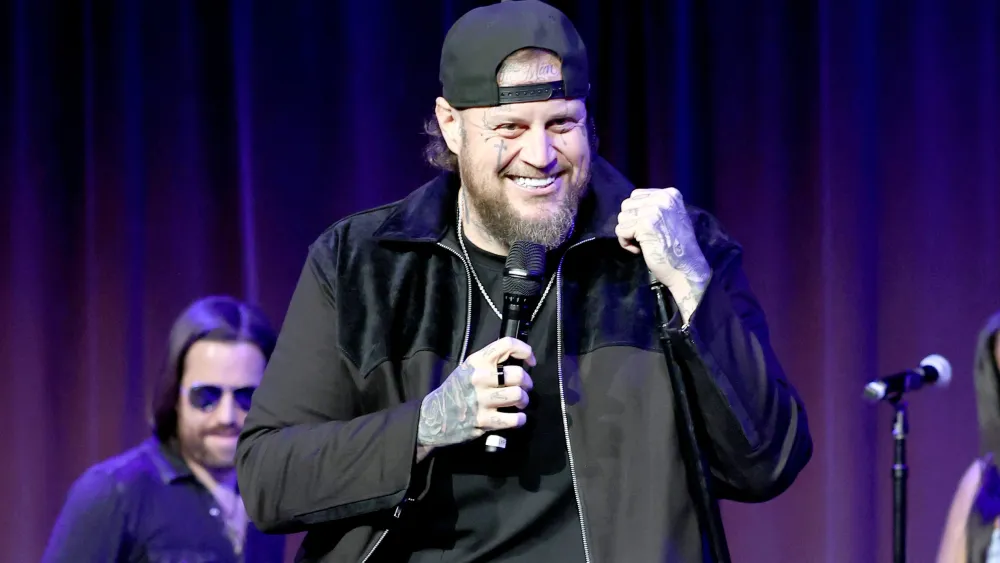
A week after the fatal shooting of Charlie Kirk, President Donald Trump and his allies are attacking critics of the right-wing activist who they say have gone too far, a campaign that detractors described as an alarming attempt to curtail one of the nation’s most hallowed civil liberties: freedom of expression.
Vice President JD Vance urged supporters to drum those “celebrating Charlie’s murder” out of their jobs and said the administration may strip tax-free status from two prominent foundations he accused of underwriting a “disgusting article” about Kirk. The State Department embarked on a global effort to identify foreign citizens “praising, rationalizing, or making light of” Kirk’s death and put them on a list to prevent them from ever receiving U.S. visas. Attorney General Pam Bondi vowed a sweeping crackdown on “hate speech.”
The governor of Texas celebrated a college student’s arrest after she mocked Kirk’s death at a public vigil. And Trump blasted ABC News’s Jonathan Karl for having “hate in your heart” and hinted at an investigation of his network.
“The radical left causes tremendous violence,” Trump told reporters in the Oval Office this week. “… The radical left really has caused a lot of problems for this country. I really think they hate our country.”
The effort represents a significant departure for the conservative movement, whose leaders for years have painted themselves as champions of free speech opposing a culture of liberal censorship.
Tech titan and former White House adviser Elon Musk bought Twitter in 2022 in part because he complained it was throttling free speech. Kirk himself blasted the idea of “hate speech” that Bondi is now threatening to use to target some of his critics. And Trump, on his first day in office in January, signed an executive order titled “Restoring Freedom of Speech and Ending Federal Censorship.”
“Over the last 4 years,” the order declared, “the previous administration trampled free speech rights by censoring Americans’ speech on online platforms, often by exerting substantial coercive pressure on third parties, such as social media companies, to moderate, deplatform, or otherwise suppress speech that the Federal Government did not approve.”
The administration’s campaign has alarmed many constitutional scholars, who say that a White House-directed crackdown on speech – especially against government workers and protesters – is a clear violation of the First Amendment and decades of Supreme Court precedent.
It has also ruffled some on the right, who accused their leaders of invoking the language of what they describe as the liberal censorship machine.
Some said that even if the administration backs away from some of its first sharp declarations or courts ultimately block them, a broader chilling effect is already underway as private citizens, organizations and employers take cues from calls for “revenge” from the most powerful people in the nation.
Trump is “very much wanting to use the tools of the government to try to silence the speech that he doesn’t like,” said Erwin Chemerinsky, dean of the University of California at Berkeley School of Law and a leading First Amendment scholar. “It’s not a new playbook for people to use power in that way, but we’ve never seen a president do anything like this before.”
First Amendment experts and Trump critics said that the campaign could thwart customary and lawful political activity, especially among Trump’s opponents. In just the past week, educators, military personnel and workers in the private sector have lost their jobs after stoking outrage with critical comments about Kirk. One member of Congress said he wanted to write legislation that would strip driver’s licenses from people cheering Kirk’s death.
Supporters of the White House campaign denied that it represents a threat to First Amendment rights and described it as a needed corrective to years in which they say they were targeted by the left for their political views.
White House Chief of Staff Susie Wiles said last week that the administration was readying a broader package of measures that would be ready “in the coming days.”
A senior White House official said, “We obviously greatly respect the First Amendment, but we also can’t allow these groups to be funding and encouraging and perpetuating violence.” The official spoke on the condition of anonymity to frankly discuss internal administration plans.
Trump and his allies have said they plan to target a large network of left-wing organizations that they say contributed to Kirk’s killing. Utah authorities have said the 22-year-old suspect espoused a “liberal” ideology but have not indicated what groups, if any, may have influenced him. They have also said that he probably acted alone.
The administration is aware of the risk of alienating some within its own political base. When Bondi said this week in a podcast interview that “there’s free speech and then there’s hate speech,” the backlash was swift against a term that originated in liberal legal circles seeking to stem verbal abuse on college campus. The remarks also drew unflattering comparisons to Kirk, who portrayed himself as a fierce defender of free-speech rights, posting on X in 2024: “Hate speech does not exist legally in America. There’s ugly speech. There’s gross speech. There’s evil speech. And ALL of it is protected by the First Amendment. Keep America free.”
“You’ve gotta think the attorney general didn’t think it through and was not attempting to desecrate the memory of the person she was purporting to celebrate,” Tucker Carlson said on his podcast Tuesday. “You hope that Charlie Kirk’s death won’t be used by a group we now call bad actors to create a society that was the opposite of the one he worked to build.”
The First Amendment historically has been interpreted to grant broad protections against government retaliation for speech. The Supreme Court has ruled that the government may not take action against government employees for categories of speech involving “public concern” so long as they don’t interfere with the functioning of the job – even when they edge toward praising violence.
In recent years, the court has taken the side of private businesses, including a baker and a wedding website designer, that said their religious beliefs were protected under the First Amendment when they refused services to same-sex couples.
Even so, private employers have wider leeway to fire their workers over what they say – and in recent days they have been doing so with encouragement from top Trump officials. Vance said Monday that if supporters spot people celebrating Kirk’s death, “Call them out, and, hell, call their employer.” And Bondi said in an interview that the Justice Department’s civil rights division would examine whether an Office Depot in Michigan had broken the law when a worker refused to print fliers for a vigil for Kirk, saying it was “propaganda.” A spokesman later said the department would take no further action after the worker was fired.
Threats typically must be accompanied by an actual demonstration of intent to secure a conviction. Any effort to expand the scope of what constitutes threatening language under federal law would almost certainly be challenged in court if any criminal charges arise. The Justice Department has not launched any formal investigations related to responses or reactions to Kirk’s killing, according to spokesman Chad Gilmartin. But the law enforcement agency is monitoring for any serious threats of violence and copycat attacks, he said.
Stephen Miller, the White House deputy chief of staff, derided free-speech defenders on Tuesday, writing on X that “the path forward is not to mimic the ACLU of the mid 90’s,” a time when the organization won high-profile free-speech cases. “It is to take all necessary and rational steps to save Western Civilization.”
At some university campuses, comments about Kirk’s death went viral, with confrontations spiraling online and school officials taking action amid conservative outrage. On Tuesday evening, Texas Gov. Greg Abbott (R), who had earlier flagged students at state universities speaking out against Kirk and called for one to be expelled and celebrated another student’s arrest, posted on social media that there is a problem in U.S. society.
“We have members of our society who celebrate an assassination, and we need a dramatic course correction,” he posted on X. “Anyone who mocks the murder of an innocent father goes beyond the bounds of what is humane, and it must end.”
Vance blasted the Ford Foundation and the Open Society Foundations, linking them to the Nation magazine, which he said printed an article that celebrated Kirk’s death, and he threatened to strip their tax-exempt status.
The Ford Foundation said it made a one-time $100,000 contribution to the Nation in 2019, while Bhaskar Sunkara, the president of the magazine, said Monday that “we’re not funded, not one dime, by [George] Soros or Open Society Foundation.”
Stripping a charitable organization of its tax-free status puts major pressure on its finances by eliminating the tax break for donors and by forcing the group to pay taxes on its profits. Any IRS decision to revoke an organization’s tax-free status could be challenged in court.
Even before Kirk’s killing, the Trump administration was taking steps to police speech by people and groups it disagreed with. It has been screening the social media activity of foreign students and sought to deport those who have participated in pro-Palestinian protests. And Trump has sued media companies he has accused of bias, including CBS, ABC, the Wall Street Journal and the New York Times.
Trump’s Federal Communications Commission held up the merger of Skydance and CBS parent company Paramount in part because it had raised objections to the network’s coverage, green-lighting it only after Paramount settled a case with Trump related to how it edited an interview last year with then-presidential candidate Kamala Harris. The FCC also investigated ABC’s parent company, Disney, over DEI policies and the content of its entertainment shows. Both companies settled lawsuits brought by Trump even though legal scholars said they probably would have won in court.
After the commission’s chairman, Brendan Carr, criticized ABC’s Jimmy Kimmel on Wednesday on a right-wing podcast, suggesting the federal agency could pull broadcast licenses owned by parent company Disney, ABC announced that it was taking “Jimmy Kimmel Live!” off the air “indefinitely.”
Deputy Attorney General Todd Blanche said Tuesday that the Justice Department will explore using the Racketeer Influenced and Corrupt Organizations Act, a law typically applied to organized crime activities, to investigate protesters who shouted at Trump at a Washington restaurant last week – an act of speech typically protected by the Constitution.
Blanche told CNN that protesters accosted Trump “with vile words and vile anger,” and he suggested that it might have been part of an “organized effort to inflict harm and terror and damage to the United States.”
But for that statute to apply, a law needs to have been broken, said Jeffrey M. Cohen, an associate professor at Boston College Law School.
“You need to have a criminal enterprise, and you need to have the criminal enterprise engage in pattern of criminal behavior,” Cohen said. “Protesting someone is not criminal behavior. I don’t see the RICO statute being applicable.”
Said Ilya Somin, a law professor at George Mason University who specializes in constitutional law and political philosophy: “You can only punish people for speech if it’s directed to inciting or producing imminent lawless action and is likely to incite or produce such action. I do not agree with this sentiment, but if somebody says they think that Charlie Kirk got what he deserved – that is awful, it deserves condemnation – but it is not in and of itself a threat of the kind that can be punished by the government.”
One legal mind turned Supreme Court justice made clear how she would act if a case were to reach the top court. Justice Sonia Sotomayor, an appointee of President Barack Obama, did not name Trump or Bondi directly in public remarks Tuesday in New York, but she made clear her view that the administration is at risk of flouting speech protections enshrined in the First Amendment.
“Every time I listen to a lawyer-trained representative saying we should criminalize free speech in some way,” Sotomayor said, “I think to myself, that law school failed.”
– – –



